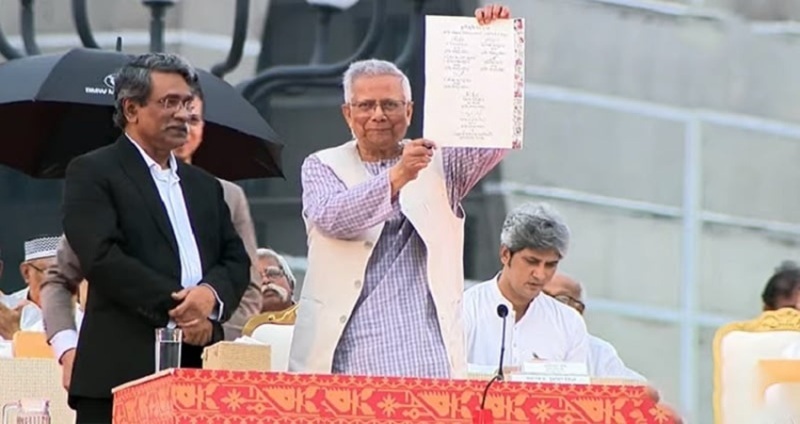Bangladesh remains stuck in a state of uncertainty. Promises of elections are being made on a regular basis. Yet nothing of a concrete plan has been offered to the country.
Meanwhile, the Awami League, despite an absence of a leadership to give it guidance, has been making its voice felt in the public domain.
A few days ago, more than twenty spontaneous demonstrations by the party and its affiliates were observed in Dhaka. News from the interior of the country has been encouraging as well.
But none of this dispels the cloud of uncertainty looming over the country. The unconstitutional regime headed by Muhammad Yunus, with its cohorts in the political arena, recently released what was referred to as a July Charter.
But the public acclaim the regime expected for the move was conspicuous by its absence. The so-called charter has been roundly condemned for the clear attempts by those who formulated it to undermine Bangladesh’s history.
In other words, it was an attempt to rewrite Bangladesh’s history through airbrushing out of the narrative significant facts associated with the emergence of the country.
The Yunus regime has sought to wipe out such vital landmarks in the country’s history as Bangabandhu’s historic declaration of March 7, 1971. It has been a reprehensible move towards negating the Proclamation of Independence as it was adopted on April 10, 1971.
The reaction has been predictable. People by and large have either rejected the so-called July Charter or have demonstrated indifference to it. On social media, reactions have been harsh, with netizens pointing out that for Bangladesh the only charter which matters is that related to 1971.
The regime is losing its way. Public support for it is at an all-time low despite the bravado people within it sometimes try to brandish in public. More importantly, people who are part of it often speak in discordant voices.
Only recently, the regime’s foreign affairs advisor refuted the claims by one of his colleagues (he did not name the colleague) of Bangladesh being tied down to a number of treaties with India that militate against Dhaka’s interests.
He made it clear that no such treaties exist. Another advisor has been grumbling that the administration is being run by expatriates. He was probably referring to the very significant number of expatriate Bangladeshis who have joined Yunus in his regime.
In the broader region of politics, the centre of discussion is currently the Awami League. Individuals associated with or supportive of the Yunus outfit have been voicing the apprehension that if and when the Awami League returns to the political centre, it is those linked to the current regime who will find themselves in danger. Fear is beginning to take hold of the regime.
Talk of some advisors worried about an exit strategy for themselves has been gaining ground. That Yunus’ advisors are apprehensive of the future comes through the noticeable decline in public pronouncements by many of them, especially those who have been vocal since August last year.
The Yunus regime, in the manner of any regime foisted on nations through arbitrary action by unconstitutional forces, spots enemies everywhere.
Journalists remain, in its eyes, its nemesis. And politicians loyal to Bangladesh’s foundational principles are a threat despite their incarceration. In recent weeks, the regime was rather nonplussed by the meeting of three western ambassadors with Sabir Hossain Chowdhury, a leading Awami League figure currently out on bail.
Add to that the constant drumbeat of hate directed at Sheikh Hasina, which is a sign of the fear associated with her probable return that assails the regime and its defenders.
Elsewhere, politics remains barren, with the Jamaat-e-Islami and the king’s party, the NCP, apparently in little mood to demand elections. For its part, the BNP is keen that elections take place by February, though it remains unsure about the manner in which the elections can take place.
With voices rising loudly both in the country and abroad in favour of an inclusive electoral exercise, meaning that the Awami League cannot be left out of the process, parties like the BNP are obviously worried.
If the Awami League enters or is permitted to enter the electoral sphere, there will undeniably be a change in the political arithmetic.
The BNP’s stand has been one of being unsure of what it actually wants. It would like to go to power, since it has been in the woods since 2006. But it simply is unable to decide on how to deal with the Yunus regime.
It wants elections but makes it a point to avoid provoking the regime into action it would not be comfortable with. Its followers do not know what the party stands for at present. With their exiled leader, Tarique Rahman, remaining abroad and giving no indication of when he might return to Dhaka, BNP activists do not quite comprehend the current situation.
Bangladesh is in a state of the volatile. The arrest of a number of senior army officers on charges stemming from their association with the Awami League government has had conversation going on all around. The officers are being tried in a civilian tribunal, which has left people mystified.
The clouds hanging low over Bangladesh are only getting darker. They will not lift anytime soon. The rule of law, which went fugitive in August 2024, is yet elusive. On a global scale, the people of Bangladesh are losing out on the economy.
ALSO READ: Bangladesh: Illegitimacy history and the need today
At home, rising prices have forced families to cut down on essential items. Meat, fish and vegetables are today luxuries people cannot afford. When a fire destroyed goods, imported as well as readied for export, at Dhaka airport last week, it only added to the woes the country has been burdened with for a long.
Overall, the feeling grows that unless political legitimacy is restored through the election of a government based on the popular will, the slide will continue.















